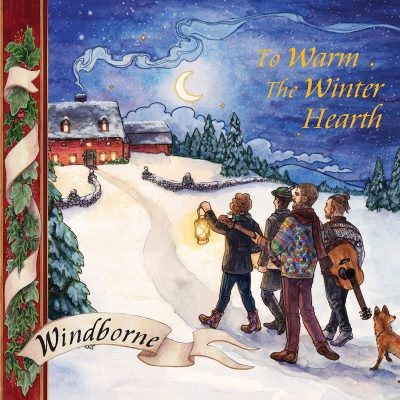
To Warm The Winter Hearth, the latest polyphonic masterpiece by New England vocal quartet Windborne, rolls in as the nights grow ever longer. The beautiful four-part harmonies offered by Lauren Breunig, Jeremy Carter-Gordon, Lynn Rowan and Will Rowan are the star of the show, but they are ably supported by guest musicians Yann Falquet on accordion and Katie McNally on fiddle.
This album is all about folklore and winter traditions, about celebration, wonder and reflection. Comprising American, European, and English folk songs, which are performed in English, Occitan (a Romance language spoken in Southern France, Monaco, and some regions of Italy and Spain), and Lithuanian, To Warm The Winter Hearth is also a call for unity across borders.
On this theme, the track ‘Aisim Bernai Kalėdaut’ is a Lithuanian wassail (more on that shortly), which translates as “Come on Lads, Sing Kalėda” and shines a light on a pre-Christian Lithuanian midwinter tradition; and ‘Satan Es Ben Estonat/Lo Paure Satan’, sung in the Occitan language and which translates to ‘Satan Was Very Surprised’, originates in a medieval manuscript and has an infectious beat that invites us to tap along.
‘Here We Come A-Wassailing’ – “wassailing” being an ancient Anglo-Saxon tradition of blessing orchards through song, dance, and music to ensure a good harvest the coming year – rolls merrily into our ears; the vocals of ‘The Boar’s Head Carol’, which dates back to the 15th century and was sung at Queen’s College Oxford on Christmas Day, are accompanied by with a wistful accordion, fiddle, and guitar line; and ‘Come And I Will Sing You’, which originated in the northwestern US in the early 1900s, brilliantly showcases the group’s tight vocal formation.
‘Malpas Wassail’ offers wonderfully uplifting, lilting harmonies and a touch of wit (“If you want any more, you can sing it yourself!”); the contemplative track ‘The Holy Holly’, a symbol of endurance through the coldest and darkest months, combines the melody composed by contemporary Scottish musician Ali Burns with newly written verses to celebrate the return of the sun at the Winter Solstice; and the pre-nativity story told in ‘The Cherry Tree Carol’ dates back to 650 AD and reverently creates space for reflection.
The theme of social consciousness, which also featured on Windborne’s 2017 debut album Song on The Times, calls for compassion for those less fortunate at these festive times of plenty (and often excess) in the melancholic, heavy ‘Time To Remember The Poor’; the jolly, tongue-in-cheek track ‘The Derby Ram’, which has its roots in the 18th century, provides a moment of levity with the fiddle and banjo dancing in and out of the lyrics; and ‘Welcome in Another Year’ and ‘The Turning Year’ unite themes of renewal, loss, and celebration, calling us to close the chapter of the old and bravely welcome in the new year.
So let yourself be transported to the crisp, frosty mists of midwinter, and think of all those who have gone before, whistling the same tunes as they strolled home from the pub along a snowy country lane, prepared festive stockings for loved ones, or cosied up by a roaring fire.









